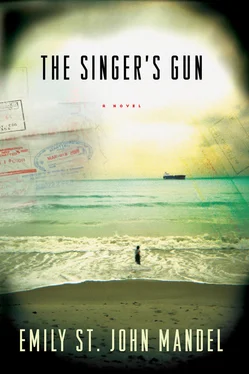Anton held on to the railing while he waited for her, the boat tossing in the wakes of the other vessels around them. He closed his eyes and felt in that moment that he could disappear here in this brilliant light so far from Brooklyn, his parents and Aria four thousand miles away.
“Wake up, sleepy. Are you really that bored?” Sophie had appeared beside him.
“No, just enjoying the sun. How was it?” She looked different from most of the others, more alive; he realized that she wasn’t disappointed.
“You should’ve gone,” she said. “It was beautiful and blue.”
“Beautiful and blue,” he repeated. He kissed her and tried not to think about Ischia.
In the morning they woke early in their hotel room on Capri. Anton opened the curtains and sunlight glanced over the tiled floor. Sophie hadn’t slept well. She was tired and moody and she didn’t want to talk to him. They ate breakfast in incompatible silence and took a taxi to the ferry. Back in Salerno there were a few dead hours. They wandered the streets amid groups of tourists, walked in and out of stores, sat for a while in a café where the waiters greeted them in English. Sophie bought an unattractive skirt. Anton lied and told her he liked it, but she accused him of insincerity and then he had to lie about lying. The train was an hour late leaving Salerno. They sat in a compartment across from a middle-aged woman who spoke even less English than Anton spoke Italian, which he wouldn’t have thought possible. When the train was forty-five minutes late the woman tapped her watch and made an exasperated face. “Italia,” she said. She shook her head and rolled her eyes. Anton nodded. Sophie was reading a biography of Jim Morrison, frowning slightly, ignoring them both.
They arrived after dark in the city of Naples.
A memory: nine years old on a cold morning in Brooklyn, waiting for the school bus with his mother in the rain. Usually Anton waited with Gary, but Gary was home sick that day and his mother didn’t like him waiting alone. The neighborhood was rougher back then. She stood over him with an enormous purple umbrella that a customer had left behind in the store.
“Why would anyone want to be a school bus driver?” Anton asked. His parents encouraged the assumption that he might grow up to be anything, and at nine things were possible that became less possible later on. It was still plausible that he might grow up to be an astronaut, for example, or the king of an as-yet-undiscovered country.
“You just make decisions as you go along, my magnificent child,” his mother said. “A or B, two options present themselves, and you choose the one that seems best at the time.”
Years later on an island in the Bay of Naples he walked a discreet distance away from the outdoor café where his new wife sat drinking coffee, waved reassuringly at her, and called Aria on his cell phone.
“I’m here,” he said. “I’m on Ischia.”
“I’ll call you back. Are you calling from your cell phone?”
“There’s no phone in my hotel room. It’s a very small hotel.”
“Well, then find a pay phone and call me back at home,” she said. “You know I don’t discuss business on cell phones. I’m at the Santa Monica apartment.”
“I don’t have the number there,” he said. She gave it to him and hung up.
He went back to the newsstand and bought a phone card. There was a pay phone on the edge of the piazza, by a low stone wall.
“Anton,” Aria said, “there’s been a slight delay.”
“How slight?”
“Three weeks.”
“Are you out of your mind? You want me to stay on this island for three weeks?” Sophie was watching him, holding a glass of coffee. She waved when he looked at her. He forced his face into a weak facsimile of a smile, raised his hand and turned his back on her.
“Four at the most,” she said. “I’m sorry, Anton. It’s out of my hands.”
“ Four? Aria, I’m sorry, listen, I can’t. . Aria, I can’t do this. We go back to Rome tomorrow. We fly home Thursday night.”
“Well, you don’t have to do it,” Aria said. “It’s of course your decision.”
“But if I don’t, you’ll tell Sophie. . you’ll tell Sophie. .” He was beside himself. He looked over his shoulder again, watching Sophie pretending not to be watching him. She sipped her coffee, gazed out at the harbor, glanced fleetingly at him where he stood with the red pay-phone receiver against his face. Aria was silent.
“Aria,” he said, “we’re family. My parents took you in.”
“And then we entered into business together,” Aria said, “and stayed in business, until you abandoned me, and now I’m asking you to do this one last thing.”
“I don’t want to do this. I’m sick of—”
“I know you don’t want to do this,” Aria said. “I’m perfectly aware of that. It’s a question of what you want to do least: perform this one last transaction, or explain to Sophie that you’re a fraud. Which is it going to be?”
He looked over his shoulder. On the other side of the piazza, Sophie sipped at her coffee and looked up at the clouds.
“My commission will be what?”
“Twelve thousand dollars for the extra trouble, secrecy, and an exit.”
“I want fifteen.”
Aria was silent for a moment and then said, “Fine. Fifteen.”
“I also want payment in advance.”
“Half now, half when the transaction’s complete.”
“Okay. I do this one last thing for you, and Sophie will never hear anything about Harvard, and I’m out of the business. Swear on something you believe in. Do you believe in anything?”
“No,” she said, “but I swear anyway. No, wait. I swear on my financial independence.”
“That’s the highest thing you believe in? Financial independence?”
“’Fraid so.”
“Jesus Christ. Three weeks?”
“Yes,” she said. “Well, possibly four.”
He hung up the receiver, closed his eyes for a moment and took several deep breaths, and then took the phone card out of his pocket and redialed.
“Four weeks,” he said, when Aria picked up. “What am I supposed to do here for four weeks?”
“You sound tense,” she said mildly. “Don’t you like Ischia?”
“I’m about to leave my wife on our honeymoon. Wouldn’t you be a little edgy?”
“As I was saying, it’ll be the easiest deal you ever played in your life. In three weeks a man will come to the hotel and introduce himself to you. You give him the package, you fly home, buy some roses for your wife, and you’re done.”
“I think this will take a little more than roses, Ari.”
“Spend some of the commission on her, then. One of those ten-thousand-dollar I’m-sorry-I-left-you-on-our-honeymoon rings from Tiffany’s.”
“Oh God, let’s not talk about rings. Who’s the client?”
“Do you want back in the business?”
“No,” he said.
“Then don’t ask me who my clients are.”
“Fine.” Anton hung up the phone and stood for a moment in the sunlight, watching the movement of boats in bright water. The boats in the Sant’Angelo harbor were painted every conceivable color, two colors per boat; yellow with blue trim, red with green, white with red. The light was too bright, the colors a kaleidoscope, sunlight piercingly brilliant off the surface of the sea. He wanted to be sick. He felt Sophie’s eyes on him from across the piazza and the thought that he’d considered leaving her anyway made the moment no easier. Three weeks. He walked to the newsstand with its supply of German newspapers, its British tabloids, its daily allotment of two International Herald Tribunes , paid for one and brought it back to Sophie. She took the front section.
Читать дальше





![Ричард Деминг - Whistle Past the Graveyard [= Give the Girl a Gun]](/books/412176/richard-deming-whistle-past-the-graveyard-give-t-thumb.webp)






